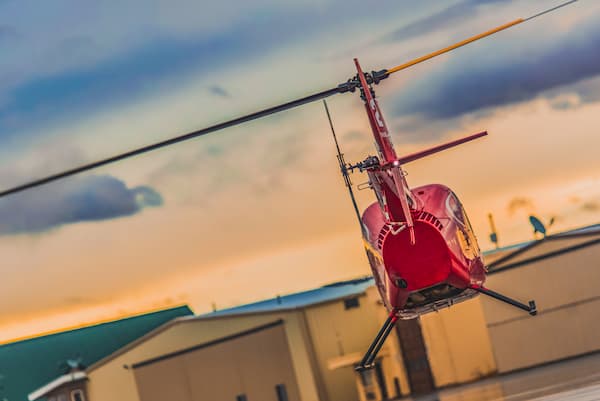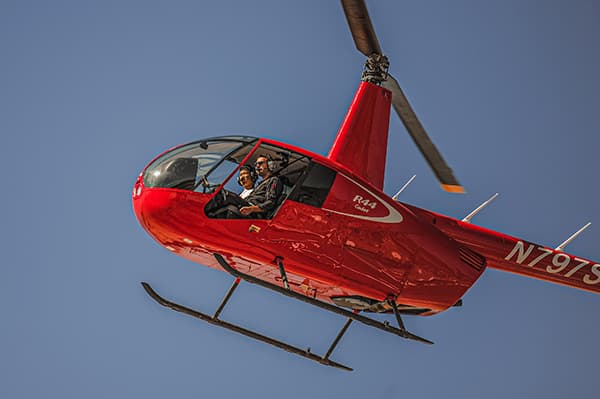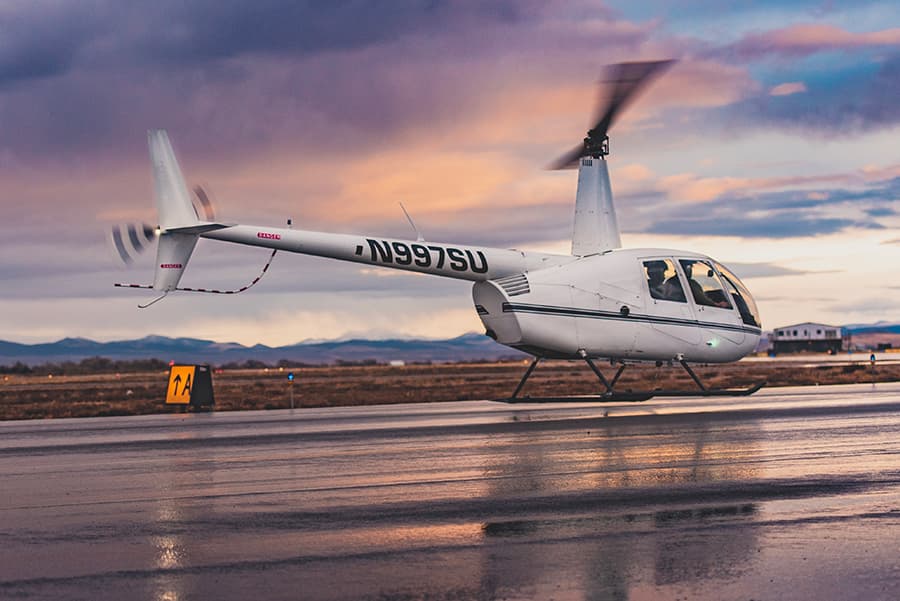How Long Does It Take to Get A Helicopter Pilot’s License?
Posted: March 02, 2020 | Author: Jaidyn Crookston | Read Time: 6 minutes

When looking to get a helicopter pilot's license, it's important to know that there are actually three basic licenses you'll need to get. In order to get a job as a pilot, you'll need to have at minimum a private pilot's license, a commercial pilot's license, and an instrument license.
In order to compete for the best jobs, you'll want to get your CFI and CFII certifications as well. These are in addition to the minimum licenses you'll need in order to start working in the industry as a pilot.
If your goal is simply to be a pilot but not get paid as one, then you'll only need your private pilot's license.
 Before you can know how long it will take to get your licenses, you'll need to decide where you'll get your training. Where you're trained will have a big impact on how long it will take to earn your helicopter pilot's licenses. There are basically two paths to getting your pilot licenses:
Before you can know how long it will take to get your licenses, you'll need to decide where you'll get your training. Where you're trained will have a big impact on how long it will take to earn your helicopter pilot's licenses. There are basically two paths to getting your pilot licenses:
- University flight school
- Non-university flight school (no degree)
If you decide to train at a university flight school, then in addition to your licenses you'll also earn a degree, which will help you stand out to your future employers. Because you are earning a degree at the same time you're training you will save a lot of time but you will need to pay for your degree as well.
How long will it take to get my license?
Every flight school is different, but at a university flight school, you can expect to spend about two years total getting all of your certifications. At a university flight school, you'll graduate with a degree, not just a certification or two.
If you only want to get your private or commercial license, then you'll want to get them at a non-university flight school rather than at a university one. Getting just these licenses will likely only take a few months or even a few weeks to complete, depending on how rigorous the program is.
Non-university flight schools are often more intense than university programs because they're shorter. These flight schools are more likely to offer only the minimum certifications and training rather than all the advanced ones, like long line, mountain operations, night vision goggles and turbine engine training. Because of this, you'll likely graduate from a non-university flight school program sooner than from a university flight program and at a lower cost. Keep in mind that if you attend a non-university flight school you'll likely graduate with only 150 flight hours rather than the 200 needed to qualify for your first job. You'll need to find a way to get these last 50 hours on your own.
Here is how long it'll typically take you to earn your licenses at a university flight school like SUU Aviation:
Private Pilot Certification
You'll earn your private pilot license during your first eight months at SUU Aviation. In this period you'll get about 70 hours of flight time. If you're only getting your license in order to have your own helicopter (which is very uncommon because of how expensive it is), then this is the only certification you'll really need. If you plan to make money flying helicopters, then you'll want to get as many certifications as you can.

Commercial l/Instrument Certification
During your third semester, you'll start working on both your instrument and your commercial pilot licenses. Your commercial license will qualify you to fly helicopters as a career and prepare you for the industry. Having an instrument license prepares you to fly in all types of weather, especially rain and fog. Having this license makes you much more valuable to your future employers and will help you be a safer pilot. This semester, you'll also practice using NVG (Night Vision Goggles) and get 55 hours of flight time.
Commercial ll/Instrument
During your fourth semester, you'll earn your commercial and instrument licenses. You'll also practice maneuver skills and become qualified in turbine engine flying. You'll have an additional 70 hours of flight time.
Certified Flight Instructor/Certified Flight Instructor Instrument
You'll earn both your CFI and your CFII during your fifth semester, with a total of 23 flight hours. Once you've earned these certifications, you'll be qualified to teach others how to fly. Working as a flight instructor is a common and ideal first job for beginning pilots, so it's a good idea to have these certifications. If you decide to get a bachelor's degree and are able to work as a flight instructor, then you'll be able to continue your education while being paid.

By attending SUU Aviation, you'll have a degree and all of your pilot licenses and qualifications in under two years of training.
If you choose to go to a non-university flight school or get training through a helicopter company, then you may be able to get your license sooner, but won't get the advanced certifications and won't have a degree or as many flight hours. The more flight hours and certifications you have, the more likely you are to get a high paying job in the future.
What you need to know before choosing a flight school
You don't need any prerequisites or previous experience in order to become a pilot. All you need is to pass an FAA Medical exam and have a desire to fly for a living and a way to get the training. You should do plenty of research before deciding which flight school is best for you and your situation. Once you decide on a flight school, apply quickly, because many schools can only train a limited number of pilots a semester and you want to save your spot.
While you don't need an actual degree in order to earn your pilot's license, an associate's or a bachelor's degree will set you above the competition and help you land higher-paying jobs. By attending a flight school that is attached to a university, you'll have the opportunity to earn a degree, as well as being eligible for financial aid, scholarships, and student loans.
How long your certifications will take to earn also depends on which certifications you're trying to get. The most basic certifications are the private helicopter license, the commercial helicopter license, and an instrument rating. Once you have earned these licenses and built up 200 flight hours, you can choose to enter the workforce and start earning money, or you can earn other certifications and build your hours and resume. If you stop with just these three licenses, it may be more difficult to find a job, since you won't be as qualified or as experienced as those competing for jobs.
 The next most common licenses are the certified flight instructor and certified flight instructor instrument. With these certifications, it's common for new pilots to get jobs working as a flight instructor. This will help you build hours and earn money. It's best to get as much advanced training as you can, since the more training you have, the more money you'll earn. Some advanced training you could get include:
The next most common licenses are the certified flight instructor and certified flight instructor instrument. With these certifications, it's common for new pilots to get jobs working as a flight instructor. This will help you build hours and earn money. It's best to get as much advanced training as you can, since the more training you have, the more money you'll earn. Some advanced training you could get include:
-
Turbine transition
-
External load
-
Mountain operations
-
Night vision goggles
By getting advanced training, you'll be more qualified to fly and will be above the competition, helping you get better jobs in the future and preparing you for any situation.
To learn more about how long it takes to earn your certifications or more about our program, contact SUU Aviation. If you're thinking about becoming a pilot but aren't sure that it's right for you, come take a tour of our facilities, talk to instructors and current students, and see our aircraft. If you have any questions, don't hesitate to call!
This article was published more than 3 years ago and might contain outdated information or broken links. As a result, its accuracy cannot be guaranteed.
Tags: Aviation




